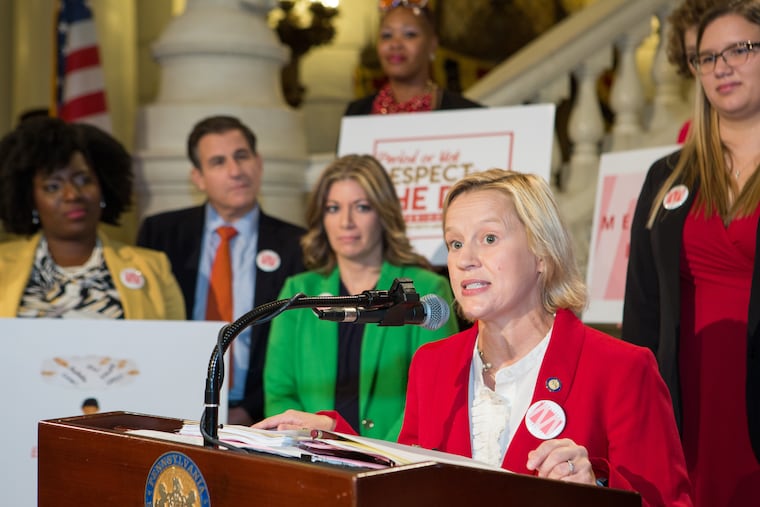Don’t call Pa.’s new female lawmakers ‘girlie’ or they’ll hold another rally about tampons | Maria Panaritis
Montgomery County state Sen. Maria Collett and other female winners of the 2018 midterms massacre are making noise to be heard in Harrisburg.

HARRISBURG — Just past the clear bowl of tampons and pads she now makes available at the front desk of her Pennsylvania Senate office, from a seat at the shiny wood table where Maria Collett and I were talking the other day in the Capitol, I leaned toward the Montgomery County Democratic freshman to disclose why I had driven all the way from Philadelphia for a rally she had just led:
“I just mostly came because I thought, you know, I’m pretty sure no one’s said menstruation from a microphone in the Capitol.”
Sure enough, Collett and other women who stormed the legislature with midterm-massacre electoral victories last fall stood in the rotunda just after lunchtime Tuesday and uttered the words menstruate, tampon, and bleed in a collective chorus. The words ricocheted off the soaring Capitol dome and marble stairs that are home to the state’s male-dominated legislature, with 64 women out of 253 overall members.
“I tried to say it,” Collett told me with a smile, “as much as I could.”
Women bleed. They bleed while in high school, while in college, while in law school, while at home with their kids, while in corporate meetings, or while cleaning other people’s toilet bowls for a living. It’s a biological reality that is not talked about or acknowledged, really, in any public way. And yet it’s so fundamental that it’s the way women are able to produce the little baby boys and girls who grow up to be men and women. No periods, no baby boys, no big boys in political power.
On its face, the “menstrual equity” rally was intended to take something women are taught to be ashamed of and bring it into full view. Speakers highlighted how some of the poorest women in the state cannot afford to buy costly feminine hygiene products. In high school, said sexual health counselor Lynette Medley, young women in Philadelphia stay home from class for fear of bleeding in public. Collett and others are pushing bills to help start making this sort of thing go away.
But this rally was about so much more.
It was about the arrival of women in Pennsylvania’s halls of power in historic numbers. It was about making sure that the men who control the House and Senate with Republican majorities, and ranking Democratic leaders, too, understand that these new colleagues are here to be heard and not herded into an invisible corner.
“We have seven women in our [Democratic] caucus, and seven out of 22 just means, statistically, that I’ll have a better seat at the table,” Collett said about the 50-member Senate. “But even when I look at [Democratic] leadership, we have one woman in leadership in our caucus. Those are the things we have to have conversations about. We have to make sure that we are reminding the other people we’re in the building with — male members — that we’re here, we got elected, and we’re not going away.”
Very few male colleagues stood with the women. Among some of those who did, a hat tip to Philadelphia’s State Rep. Malcolm Kenyatta and State Sen. Larry Farnese (who smiled at some of the more graphically candid moments — bless you, Lar, for showing up and staying put).
Collett was one of five women elected to the Senate last year, bringing the total to 12 out of 50. On the House side, the ranks of women grew by nine (total of 52 in that chamber of 203). Today, the General Assembly is one-quarter women. It was, before last fall, a mere 19%.
They call Collett “kid” in the Capitol, she told me, even though she is a lawyer, a nurse, and 45 — two years older than John F. Kennedy was when he became president of the United States in 1961.
One elder Republican Senate colleague called her “girlie” in their first meeting. And at a local Chamber of Commerce breakfast in northern Montgomery County, she was the only elected official at a table of state senators and representatives introduced without a courtesy title or even her full name.
“‘Oh, look, Maria’s here, too,’” she and her chief of staff, Correne Kristiansen, told me was the emcee’s choice of words.
These newly elected women are not cut from the establishment cloth — male or otherwise. They are largely newcomers to politics. The physical office that Collett occupies — a vast piece of regal real estate that faces the GOP Senate Caucus room near the rotunda — previously belonged to a name familiar to many Philadelphia-area residents: Stewart Greenleaf Sr.
Greenleaf held that seat in his mostly split suburban Philadelphia district for 40 years until deciding last year would be his last. His son and namesake sought to succeed him, but Collett burst that bubble. She flipped the seat Democratic, too.
So, yes — the women are past the gates. They’re on the inside. And they are talking about menstruation in the presence of men.
“So many of them, I think, forget that we’re here, would like to ignore that we’re here,” Collett said of her elected colleagues. “But we’re here, and we’re here in large numbers, and we’re here to talk about the things that are important to the women in the commonwealth.”
If it means more period talk to break them down, I’m ready to ride west for the next one.